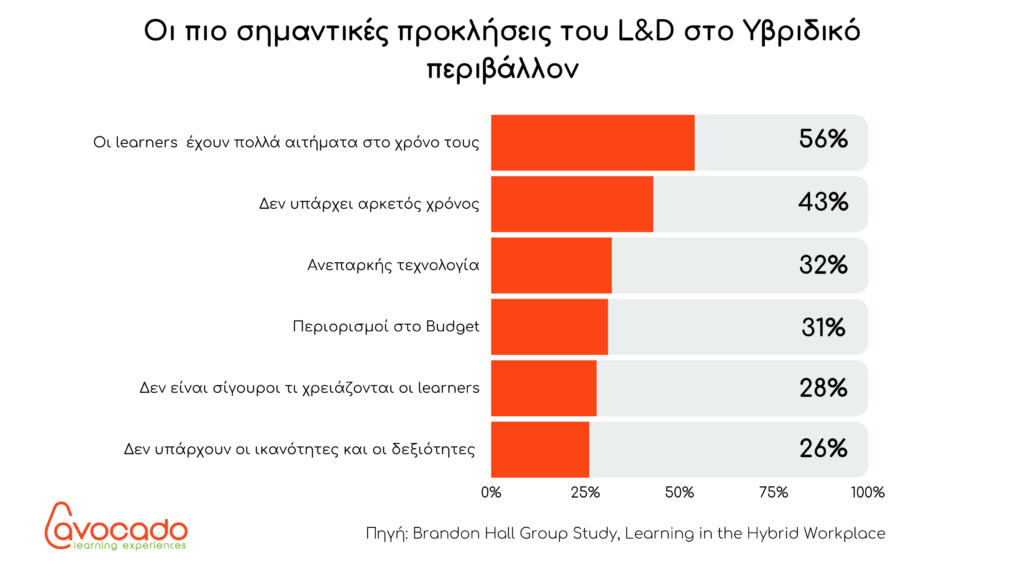The hybrid work model is based on flexibility and adaptability. This is the need for adjustments to the L&D strategy to support this model.
The opportunities that come with organizations establishing the hybrid work model affect many areas.
For employees: better control of their personal time, development of their wellbeing, better focus and productivity… a more balanced personal life.
For organizations: reduced operating costs, better employee well-being and loyalty, and so on.
At the same time, there is no denying that it also brings many challenges: it changes the concept of “workplace” – from the concept of physical space, to working from everywhere. It clearly differentiates the priorities of leaders and the way they shape and relate to teams. It creates a push towards digital skills, automation and horizontal structures. At the same time it encompasses a spectrum of continuous change across multiple dimensions.
How can L&D contribute?
The pandemic and the rapid changes it has brought about have placed L&D in the role of catalyst for adapting people, teams and managers to new conditions and for strengthening engagement. And that is where it is essential that it remains.
The challenges it faces can be summarised as follows:
- Employees are dealing with many issues that require their time
- They do not have time for learning
- Limitations in budget
- No clarity on the needs of learners
- Lack of skills and competencies in organization
- The available technology is not sufficient
(See diagram)

L&D strategies for the Hybrid working environment
With this data, the next day has already begun. The L&D strategy, in the future hybrid environment, must include the following elements:
It is a matter of mindset
No matter how many digital savvy programs one attends, no matter how much they explain how to collaborate through collaboration tools, success will be determined by adopting the right mindset: That is, the extent to which employees are open to learning, seeking their development not because they have to but because they want to. The flexibility they show in an environment of constant change.
Already L&D departments here in Greece have emphasized the building of Mindset which is increasingly rising on the agenda.
Emphasis on leaders
The leader of a hybrid team needs to be supported to promote autonomy, self-sufficiency and personal accountability. How will he or she bring results with people he or she may not even see? The emphasis here is on developing communication skills and empathy. Also, on ways to develop personal accountability in the team and eliminating micromanagement as well as developing talent in a remote environment.
Developing hybrid leadership capacity is not a luxury. It is a prerequisite for success.
Real flexibility
Flexibility is not just a buzzword. L&D experts are challenged to build a learning environment that reflects the flexibility required of hybrid employees. This includes on-demand programs that meet personalized needs whenever and wherever employees want. The pitfall in this piece is simply returning to the pre-pandemic mode of training (classroom only or large e-learning courses).
The answer lies in flexible learning paths that combine asynchronous elements and short-duration microlearning tools with hands-on collaboration and consolidation sessions (in the classroom or online).
From commitment how are we doing?
Considering that people’s attention span is dramatically decreasing – a result of technology and multi-tasking – , engagement in learning is becoming no simple matter.
How can L&D experts ensure this engagement in the hybrid environment?
• It is essential that programs include many different channels and modes of learning that meet different needs
• The combination of synchronous and asynchronous learning
• Interactive experiences that engage the learner
• Include collaboration and social learning
• Combine and adapt to the reality of the organisation
• Provide the opportunity for practical application and learning from subject matter experts that continues after the end of the programme
The more the merrier
The hybrid worker may often spend a large part of the day in front of a screen. The learning experiences should not burden him/her but should give him/her a rest.
It is therefore necessary to move to short and comprehensive experiences, whether asynchronous or face-to-face.
The digital ecosystem
The tools used by the organisation to respond to the hybrid working model can be successfully leveraged in learning programmes.
The digital and/or hybrid classroom, synchronous and asynchronous collaboration tools, intranet, etc. are part of the technological ecosystem that is necessary to integrate into learning.
“Voice of the people”
The success of the hybrid model is related to the extent to which people are involved in the outcome.
It works similarly in learning:
• Involving employees in shaping learning programmes (polls, focus groups, awareness instruments)
•The search for meaningful feedback during
• The readiness to adapt programmes
This is the moment when general training objectives are necessary to be transformed into individual development objectives. That is, each participant in a programme must have meaningful reasons for participating and specific outcomes they want to achieve.
Continuous learning
Finally, in this environment which imposes constant change and transition, L&D programmes can only encourage continuous learning.
Certainly along the way, L&D specialists will also have new tools and methodologies at their disposal to respond to what is to come. What is important, however, is to be ready to adapt and adjust, but also to be in close contact with the recipients of these programmes.
The Avocado Learning Experiences
At Avocado Learning Experiences we are constantly seeking and adapting our methodologies and content to support all these challenges.
We design human-centered programs with the most up-to-date content, leveraging both technology and the ultimate customization to meet the needs of organizations and teams.
Solutions that take into account new circumstances, objectives and needs of organizations and participants alike.
We have already supported major organisations to support the transition to the hybrid model on a large scale, providing a comprehensive range of services that is constantly expanding.
Marina Kounalaki
Managing Partner
Avocado Learning Experiences
The article was published in HR PROFESSIONAL in the February 2023 issue by BOUSSIAS Publications

